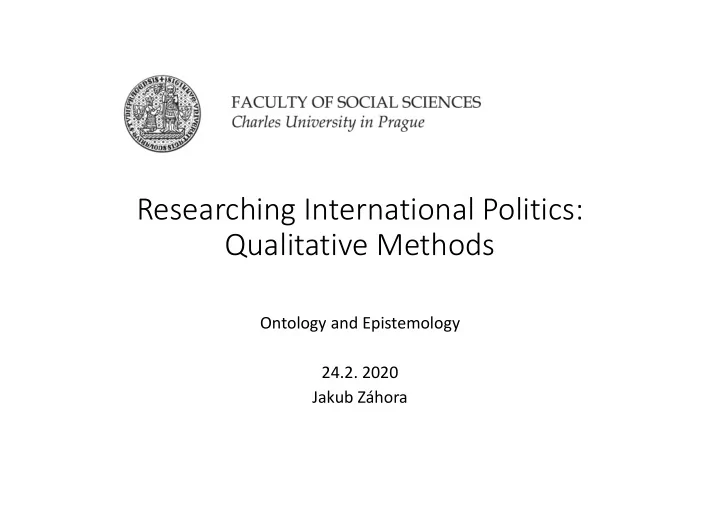

Researching International Politics: Qualitative Methods Ontology and Epistemology 24.2. 2020 Jakub Záhora
Aim of the lecture: Brutally simple (and simplistic) introduction to philosophy of science and metatheory of IR
Class outline • What is ontology and epistemology? • Why should I care? • Two basic approaches and their comparison • Connection between meta-theory, theory, methodology and methods
Metatheory: Ontology and epistemology • Ontology – “a particular theory about the nature of being or the kinds of things that have existence” (Merriam- Webster Dictionary) – What is the world made of? What is its nature? • Epistemology – “the study or a theory of the nature and grounds of knowledge especially with reference to its limits and validity” (Merriam-Webster Dictionary) – How can we find things about the world?
Example I: Marxism • The social and political life is based on the allocation of capital and forms economic production • In order to comprehend the world, we need to look at the distribution of capital and means of production
Example II: Post-colonialism • The current conditions are product of the relationship between the metropolis and the colony/the West and the Rest • We need to investigate history of colonial dominance, its practices, how they operated, what are their lasting/ongoing effects
So what???
IR and Security Studies seek to better understand international politics and security – we need to have a grasp of how society and politics operate in general Intellectual rigor and consistency
We all have some assumptions about how the world works – it is useful (personally, politically and academically) to be explicit about it and reflect on our positions
These assumptions have impact on policy-making
• Last but not least: your research projects
Two basic paradigms
Ontological positions Epistemological positions Objectivism Constructivism Positivism Interpretivism
Objectivism and positivism
• World is composed of objective reality which exist independently of our beliefs and thoughts and which can be found using proper methods • There is a clear distinction between the way the world is and our beliefs and understandings • Derives from natural science (social and the natural worlds are essentially the same) • We can observe , measure and classify phenomena • Mostly the material and the physical is considered significant – crucial role of senses • Events have clear causes – discerning causality is the key task of science (independent – dependent variables) • These causes have law-like nature and regularity • Value-free and neutral inquiry is possible and desirable • Ask “why” questions • Seeks to explain processes
Practical-methodological implications • Both qualitative and quantitative studies • Usually linear research process with clear research design • Development and testing of theories and hypotheses • Deductive/abductive
Critique? • Measuring and classifying always somewhat arbitrary • Can we be really objective and detach our opinions from the subject of study?
Constructivism and interpretivism
• There is external reality, but it is known through human mind, its understanding is socially constructed • We need approaches different from those adopted from natural sciences, attuned to the human experience • Knowledge is produced by understanding how other people understand the world • The “objective reality” is comprehended differently by different people, although there are some shared, societal (inter-subjective) frames • Human agency and meaning-making practices mediate between the “world out there” and the social/political sphere • Looks into conditions of possibility for human actions • Phenomena have causes but these are not transcendent and non-changeable – the notion of “ emergent causality ” • Since researchers are humans, they cannot separate their beliefs and positions from what they study • Ask “how” questions • Seeks to understand processes
Practical-methodological implications • Qualitative studies • “Messier” research project with evolving research design • Theories and concepts used to make sense of and organize the data • Back-and-forth relationship between data and theory • Inductive/abductive
Critique • Too subjective – the line between science and advocacy blurred • Cannot tell us much about general rules
Example: The US Invasion of Iraq
Positivist approach(es) • “It is about oil” theory: foreign policy is driven by economic interests • Causal link between oil reserves in Iraq and the US invasion • Qualitative study: process-tracing • Oil companies want to exploit Iraqi fields > lobbying in the Congress and the White House > decision to invade Iraq • Quantitative study • Dataset of Western invasions • How many invasions were aimed against countries with large natural resources base?
Interpretivist approach • How come so many people were convinced that Iraq had WMD? • How was the invasion justified? • How did the leading figures think about their decisions? • How were these things related to larger social and political conditions and meaning-making practices (Orientalist imaginary)?
So… what should I choose? • Different approaches ask different questions • It depends on what you are after • Personal proclivities and preferences • Practical concerns – availability of data
Correspondence between metatheory and methods • One cannot arbitrarily combine conflicting approaches • Metatheoretical (ontological and epistemological) position informs theoretical choices • These in turn narrow down possible methodological choices • Lastly, one needs to use proper methods
Metatheoretical Theory Methodology Methods position
Questions?
Recommend
More recommend